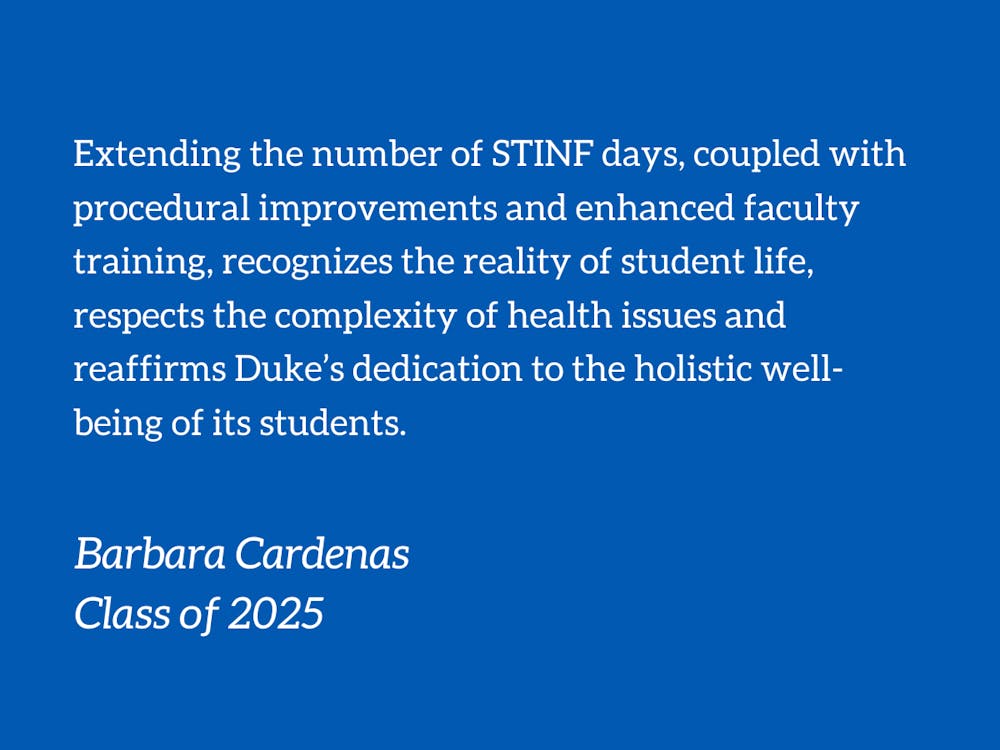At Duke, the current policy governing Short-Term Illness Notifications (STINFs) offers a scant three days per semester for student absences due to illness without the need for medical documentation. While this policy might seem compassionate at first glance, its limitations quickly become apparent, especially when facing the unpredictable nature of health challenges. I believe it's time for Duke to critically reassess and significantly expand the STINF policy. By doing so, we can move towards a more inclusive, supportive and health-conscious academic framework that better addresses the diverse needs of our student body.
The complex landscape of student health
The foundational intent behind the STINF policy — to afford students a brief respite from academic responsibilities during health-related challenges — is commendably straightforward. Yet, the application of this policy reveals a stark oversight of the varied and unpredictable health issues that can afflict students. Mental health challenges such as anxiety, depression and stress-related conditions, alongside prolonged physical illnesses, are examples of when the policy falls short. The prevailing assumption that all health issues can be neatly resolved within a mere three-day span is not only outdated but dangerously dismissive of the realities of both physical illnesses and mental health crises. From severe flu episodes and mononucleosis to debilitating depressive episodes, the range of health issues that students can face varies widely in both duration and impact on their academic capabilities.
Adding to the complexity is the procedural discomfort and stress involved in requesting additional STINF days, a process that is especially fraught for those dealing with mental health issues. The current requirement to disclose one's health situation to deans or professors, albeit typically met with understanding, imposes an additional emotional burden on students. This requirement often discourages students from seeking the support they desperately need, exacerbating their stress and vulnerability.
A call for tangible solutions
Addressing these challenges necessitates a comprehensive reform of the STINF policy. An initial step should be to increase the STINF allocation to at least five days per semester — a full academic week. This adjustment would provide students with the necessary flexibility to manage their health without the looming threat of academic penalties. Recognizing the variability of health issues and the time required for recovery, this policy revision would reflect a more realistic and compassionate approach to student health.
Furthermore, the establishment of a streamlined process for requesting additional STINF days could significantly alleviate the current procedural discomfort. An improved online submission system, designed to maintain student privacy while efficiently managing STINF requests, could address these concerns. This system would anonymize student submissions but assign a unique identifier to each student, known only to a designated administrator. Professors would be notified of approved absences through this system, ensuring privacy. The system could also track the number of STINF days each student has used, keeping deans informed without compromising student anonymity. This approach would reduce the emotional toll on students while preserving the integrity of the process.
Addressing concerns
Critics might contend that expanding the number of STINF days could inadvertently encourage abuse of the policy, with students potentially exploiting the system for unwarranted absences. This argument, however, overlooks the broader benefits of a more flexible and compassionate policy framework. By instituting a requirement for consultation with Duke Wellness for absences that extend beyond the initially allocated STINF days, the university can ensure that students receive the appropriate support while maintaining the integrity of the academic process. This balanced approach respects student autonomy and health needs while safeguarding the educational standards that Duke upholds.
Envisioning a health-conscious campus culture
Extending the number of STINF days, coupled with procedural improvements and enhanced faculty training, recognizes the reality of student life, respects the complexity of health issues and reaffirms Duke’s dedication to the holistic well-being of its students. By acknowledging the complex nature of student health and the inherent challenges of navigating academic responsibilities amidst health crises, Duke has the opportunity to lead by example in the realm of higher education.
The university stands at a crossroads, with the opportunity to redefine its approach to student health — a chance to ensure that every student has the support they need to thrive academically and personally, irrespective of the health challenges they may face. By embracing these changes, Duke can affirm its role as a leading institution that values and actively supports the health and success of its student body.
Barbara Cardenas is a Trinity junior. Her column typically runs on alternate Mondays.
Get The Chronicle straight to your inbox
Signup for our weekly newsletter. Cancel at any time.

